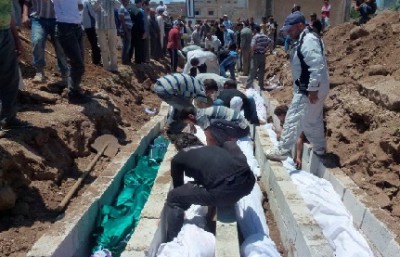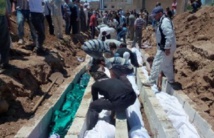"At least 20 civilians were killed in the heavy shelling and air attacks since (Saturday) morning on Douma," said Rami Abdel Rahman, head of the Syrian Observatory for Human Rights.
He said around 200 more were either wounded or still trapped under rubble, and that the death toll was expected to rise.
The Syrian Revolution General Commission, an activist group that publishes daily updates on the country's conflict, said women and children were among those killed.
"Wounded and dead are still being removed from under the rubble," the SRGC said in an emailed statement.
The Local Coordination Committees activist network said Saturday's bombardment struck four adjacent buildings.
Photographs published online by a local activist group called the Douma Coordination Committee depicted a young, bloodied child being carried across a field of concrete rubble.
- Air strikes on Harasta -
In the pictures, volunteers searched through crumbling buildings, some missing entire walls, hoping to find survivors.
A child caked with blood and dust lay in a field clinic, his eyes half-open as a medic tended to him.
By early evening on Saturday, the group also began publishing the names and pictures of the dead on Facebook.
Douma is part of the rebel-held Eastern Ghouta area, which is regularly targeted by regime shelling and bombardment and has been under a suffocating siege for nearly two years.
On Saturday, government air strikes also hit the Eastern Ghouta town of Harasta, where troops loyal to embattled President Bashar al-Assad were clashing with Islamist rebels, the Britain-based Observatory said.
Syria's national news agency SANA said shelling by "terrorists" near Harasta had wounded four people.
It said "takfiri (extremist Sunni) terrorists" were based in Douma and Harasta. The government refers to all groups opposed to it as "terrorists".
According to Abdel Rahman, Eastern Ghouta is the largest and most important rebel bastion near Damascus.
It is largely controlled by the powerful Jaish al-Islam rebel group, but Al-Qaeda's Syrian affiliate, Al-Nusra Front, also has a presence there.
- 'Disregard for civilians' -
On Sunday, at least 117 people -- mostly civilians -- were killed in government air raids on Douma, the Observatory said.
Their deaths were denounced by global powers as well as rights groups, which lambasted the Assad regime's indiscriminate attacks on civilians.
Human Rights Watch urged the United Nations to impose an arms embargo on the Syrian government after Sunday's attacks, which the rights group said demonstrated the regime's "appalling disregard for civilians".
But Damascus has insisted it is waging war against "terrorism", with Foreign Minister Walid Muallem defending last week's attacks.
He said "many of the terrorists use civilians as human shields, so what is claimed about massacres in Douma or elsewhere is fabricated news".
The deaths in Eastern Ghouta come two years after a chemical weapons attack on the area killed hundreds of people and was largely blamed on the government.
Also on Saturday, the family of celebrated archaeologist Khaled al-Assaad, who was executed by the extremist Islamic State group earlier this week, fled to safety from the ancient city of Palmyra.
Syrian antiquities head Mamoun Abdulkarim said Assaad's wife and three sons -- including the current director of antiquities in Palmyra, Walid al-Assaad -- reached the government-held city of Homs on Saturday.
--------------------------------------------------------------------------------------------------------------------------
He said around 200 more were either wounded or still trapped under rubble, and that the death toll was expected to rise.
The Syrian Revolution General Commission, an activist group that publishes daily updates on the country's conflict, said women and children were among those killed.
"Wounded and dead are still being removed from under the rubble," the SRGC said in an emailed statement.
The Local Coordination Committees activist network said Saturday's bombardment struck four adjacent buildings.
Photographs published online by a local activist group called the Douma Coordination Committee depicted a young, bloodied child being carried across a field of concrete rubble.
- Air strikes on Harasta -
In the pictures, volunteers searched through crumbling buildings, some missing entire walls, hoping to find survivors.
A child caked with blood and dust lay in a field clinic, his eyes half-open as a medic tended to him.
By early evening on Saturday, the group also began publishing the names and pictures of the dead on Facebook.
Douma is part of the rebel-held Eastern Ghouta area, which is regularly targeted by regime shelling and bombardment and has been under a suffocating siege for nearly two years.
On Saturday, government air strikes also hit the Eastern Ghouta town of Harasta, where troops loyal to embattled President Bashar al-Assad were clashing with Islamist rebels, the Britain-based Observatory said.
Syria's national news agency SANA said shelling by "terrorists" near Harasta had wounded four people.
It said "takfiri (extremist Sunni) terrorists" were based in Douma and Harasta. The government refers to all groups opposed to it as "terrorists".
According to Abdel Rahman, Eastern Ghouta is the largest and most important rebel bastion near Damascus.
It is largely controlled by the powerful Jaish al-Islam rebel group, but Al-Qaeda's Syrian affiliate, Al-Nusra Front, also has a presence there.
- 'Disregard for civilians' -
On Sunday, at least 117 people -- mostly civilians -- were killed in government air raids on Douma, the Observatory said.
Their deaths were denounced by global powers as well as rights groups, which lambasted the Assad regime's indiscriminate attacks on civilians.
Human Rights Watch urged the United Nations to impose an arms embargo on the Syrian government after Sunday's attacks, which the rights group said demonstrated the regime's "appalling disregard for civilians".
But Damascus has insisted it is waging war against "terrorism", with Foreign Minister Walid Muallem defending last week's attacks.
He said "many of the terrorists use civilians as human shields, so what is claimed about massacres in Douma or elsewhere is fabricated news".
The deaths in Eastern Ghouta come two years after a chemical weapons attack on the area killed hundreds of people and was largely blamed on the government.
Also on Saturday, the family of celebrated archaeologist Khaled al-Assaad, who was executed by the extremist Islamic State group earlier this week, fled to safety from the ancient city of Palmyra.
Syrian antiquities head Mamoun Abdulkarim said Assaad's wife and three sons -- including the current director of antiquities in Palmyra, Walid al-Assaad -- reached the government-held city of Homs on Saturday.
--------------------------------------------------------------------------------------------------------------------------









 Home
Home Politics
Politics











